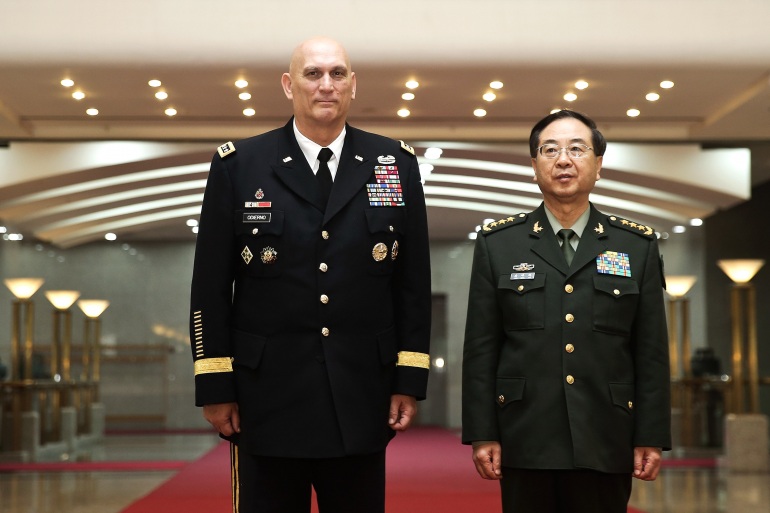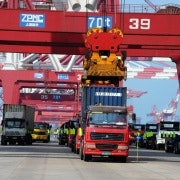Cooling the cold war mindset in Asia

US army Chief of Staff General Ray Odierno (L) poses with Fang Huifeng, Chief of the General Staff of the People's Liberation Army, at Bayi Building in Beijing on February 21, 2014. AFP PHOTO / POOL
There has been a tad elevation in the excitement of the political-security community about drawing lines in the sand around China’s rise and the interests of the United States and its allies in recent months, with more than a hint that a new Cold War is emerging in East Asia along the lines of that in earlier times between the old Soviet Union and the Western bloc.
Perhaps this is more noticeable in some countries than others: in Australia, where a new government has been totally wrong-footed in its management of external relations through complicity with a security apparatus that a growing number of reasonable people are beginning to think is not subject to effective political control; in Japan, where the extreme right has been let off the leash; and in the Philippines, where there is political advantage in local nationalism over the rocks issue.
Significantly, though this current in American thinking about how to deal with the world is always swirling around under the surface, it is not currently a significant factor in mainstream or Obama administration thinking. The newly instigated US-China leadership dialogue is a powerful symbol of quite the opposite stream in both US and Chinese thinking. As can be seen in this pattern of developments, the challenge for the United States is to limit the impact of the excitable fringe in its management of its core bilateral relationship with China.
The fact is that the world in which the rise of China is taking place and the world in which the Cold War broke out are very different worlds. The United States and China are both locked into a global economic and political system that is characterised by deep interdependence. Economic interdependence between the Soviet Union and the United States through most of the Cold War was close to zilch.
China is committed to the same international rules and norms in the international trading system as the United States. The global economic and political regime was fundamentally bifurcated during the Cold War, and the development of common rules and norms did not extend beyond the so-called ‘free world’. These differences are profound. However incomplete and imperfect, today’s global economic-political system constrains the way in which its largest and most important adherents relate to each other if they behave rationally in their own self interests.
Well, one might object, economic interdependence before the Great War in Europe, on the outbreak of which much is being written in this anniversary year, was also high -- but did it constrain war between the pretender of the day, Germany, and the established power, Great Britain? Economic interdependence and the international system in 1914 were entirely different from what has been constructed post-World War II. Also, of course, humans are prone to behave irrationally from time to time. But rarely will such behaviour be calculated or allowed to bring the highly valued system down.
In most of the US-aligned political-security community -- with the important exception of that in the United States itself -- understanding of these new interdependencies is neither part of the framework of strategic analysis nor widely understood. How else can one understand what passes for strategic analysis of the impact of Chinese economic power? One view is that this mindset has taken over foreign policy thinking in Australia, for example, in recent times, but there is some evidence of more nuance in the policy community there. The US Pentagon and strategic studies community more broadly suffer far less in the way of these limitations in the framework of their analysis, routinely drawing in economic, cultural, astro-physics, military, and a whole range of other talent into security scenario building and assessments.
In a timely review of this issue, Stephan Frühling’s asks: ‘Is the Cold War really a useful paradigm for the tensions caused by China’s rise -- and if so, what are its most relevant lessons for East Asia today’? His answer is a resounding ‘no’.
‘Despite superficial parallels between today’s China and the Soviet Union … it is difficult to see that current differences between China and the Philippines, or China and Japan, amount to a similar threat to the existence of the ‘free world’ itself. This is not to belittle the challenge that China’s view of international affairs poses to the system of international law and the principle of (legal) equality of states on which the current international system is based. But China’s aspirations are not to sweep away the domestic political systems of the US and its allies, nor are they expansionist in the way that the Soviet Union subjugated Eastern Europe, or sought to do in Afghanistan or Angola.
China and the West are not isolated from each other in the way the Soviet Union was, and today’s conflict is about status, not ideology. Increasing firmness and resolve in meeting Chinese provocations may well be necessary to manage regional tensions, but even more forceful proposals for pushing back against China are still a far cry from the economic, political and military necessities that fighting the Cold War imposed on the US and its allies. There is a danger that evoking the image of the implacable Cold War struggle with the Soviet Union may well become a self-fulfilling prophecy’.
That puts it as clearly as it can be put, for the moment. But this perspective also raises big questions about strategic thinking and policy making in our region, presently and most particularly in Australia and Japan.
Peter Drysdale is Editor of the East Asia Forum.
This article was originally published on East Asia Forum. Republished with permission.
















